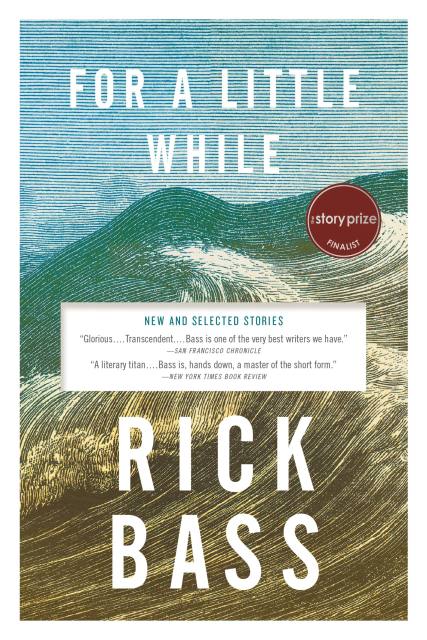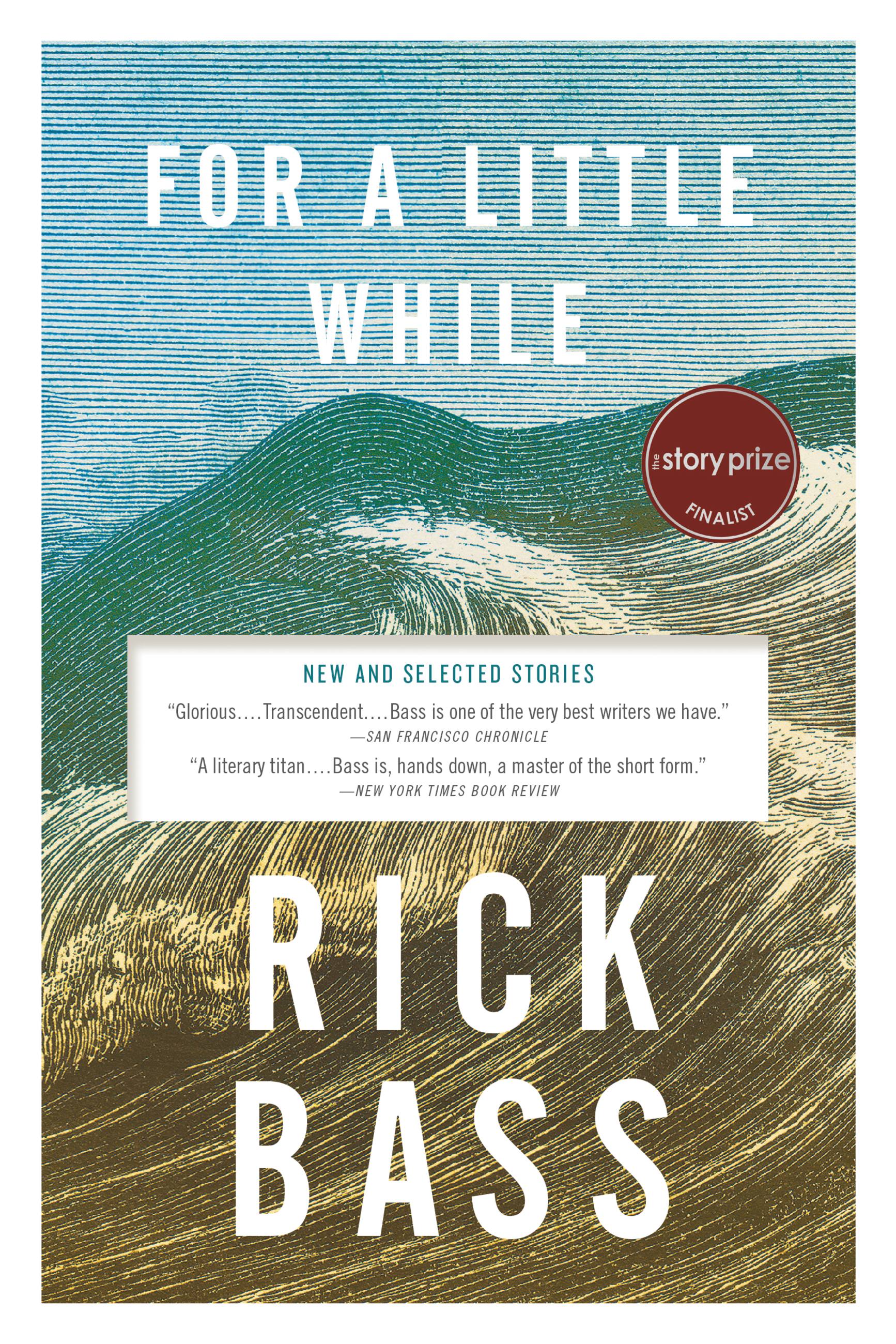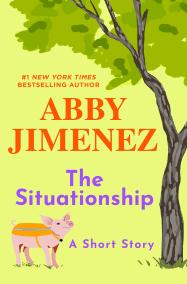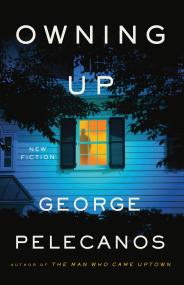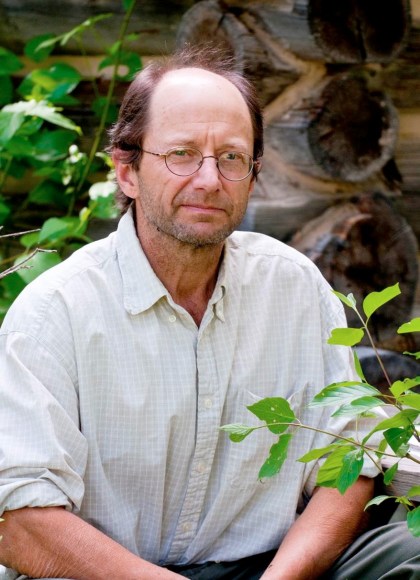By clicking “Accept,” you agree to the use of cookies and similar technologies on your device as set forth in our Cookie Policy and our Privacy Policy. Please note that certain cookies are essential for this website to function properly and do not require user consent to be deployed.
For a Little While
Contributors
By Rick Bass
Formats and Prices
- On Sale
- Mar 1, 2016
- Page Count
- 480 pages
- Publisher
- Little, Brown and Company
- ISBN-13
- 9780316381178
Price
$12.99Price
$16.99 CADFormat
Format:
- ebook $12.99 $16.99 CAD
- Audiobook Download (Unabridged) $38.99
- Trade Paperback $24.99 $31.99 CAD
This item is a preorder. Your payment method will be charged immediately, and the product is expected to ship on or around March 1, 2016. This date is subject to change due to shipping delays beyond our control.
Buy from Other Retailers:
Long considered one of the most gifted practitioners of the short story, Rick Bass is unsurpassed in his ability to perceive and portray the enduring truths of the human heart. Now, at last, we have the definitive collection of stories, new and old, from the writer Newsweek has called “an American classic.” To read his fiction is to feel more alive — connected, incandescently, to “the brief longshot of having been chosen for the human experience,” as one of his characters puts it.
These pages reveal men and women living with passion and tenderness at the outer limits of the senses, each attempting to triumph against fate. Bass provides searing insights into the complexity of family and romantic entanglements, and his lush and striking language draws us ineluctably into the lives of these engaging people and their vivid surroundings. The intricate stories collected in For A Little While — brimming with magic and wonder, filled with hard-won empathy, marbled throughout with astonishing imagery — have the power both to devastate and to uplift. Together they showcase an iconic American master at his peak.
These pages reveal men and women living with passion and tenderness at the outer limits of the senses, each attempting to triumph against fate. Bass provides searing insights into the complexity of family and romantic entanglements, and his lush and striking language draws us ineluctably into the lives of these engaging people and their vivid surroundings. The intricate stories collected in For A Little While — brimming with magic and wonder, filled with hard-won empathy, marbled throughout with astonishing imagery — have the power both to devastate and to uplift. Together they showcase an iconic American master at his peak.
-
Praise for For A Little WhileSmith Henderson, New York Times Book Review
"In For a Little While we have a core sample of a literary titan. At last. For what comes into focus in this collection is that Bass hasn't been writing just to save our wild places, but to save what's wild and humane and best within us. Bass is, hands down, a master of the short form, creating in a few pages a natural world of mythic proportions . . . Bass's world-building is so beautiful, crisp, and perfect . . . He renders every detail with bracing exactness . . . In every story in this collection, Bass goes into the heart of the matter . . . As you roll through this rollicking survey of Bass's fiction you begin to feel an uncomplicated holy motion . . . The pleasure and privilege of reading Rick Bass is to see how sacred we are . . . The greatest joy in For a Little While is the belief, in story after story, in the goodness of all things on this earth, including us."
-
"For a Little While offers ongoing and fresh evidence that Bass continues to be a master of the short story . . . These heartbreaking, strangely elegiac yet hopeful stories give us the range of what a story can be. Some bloom into tales with nearly all the depth of a novel . . . Others serve as elegant grace notes to entire lives . . . Still other stories work like high lonesome ballads, wrangling loss, love, and hope into haunting harmonies that chill to the bone. The opening story, 'Wild Horses,' is as deeply moving a story as I've read. It traces the slow path toward the ability to love, despite scars that won't ever disappear . . . The influences one can feel in these pages include not only the realist troika of Carver and Ford and Tobias Wolff, but also William Faulkner and Barry Hannah, Gabriel García Márquez, and Eudora Welty too; there's even Tolstoy of the late fables in which people off another grid entirely bear witness to the fact of their own cruel and graceful existence. But everywhere in this beautiful summary collection is a singular voice, that of Rick Bass and Rick Bass only, a writer whose early promise continues to be an enduring gift to readers. Here's to thirty more years."Bret Lott, Boston Globe
-
"A profoundly satisfying collection, a plunge into rich and varied lives and landscapes. Bass's prose is charged with a lyrical intensity rare in American fiction. The beauty of his sentences recalls the stylistic finesse of McCarthy and Willa Cather, but he does more than just write prettily. Reading Rick Bass offers the deep pleasure of reinhabiting an older world, one that's not lost so much as latent and usually unnoticed . . . Bass, like McCarthy or Faulkner, reaches the universal by revealing the hidden infinities of the particular, both in humans and the landscapes they occupy . . . His metaphors proliferate with an inexhaustible fecundity . . . Bass's short fiction features many ecstatic, dangerous moments-a brush with a mountain lion at dusk, the surging adrenaline of a firefighter in a collapsing house, a girl's pride and confusion after killing her first elk. But he's also capable of wry humor and great subtlety . . . Each line of Bass's extraordinary prose brings you more awake."Nick Romeo, Chicago Tribune
-
"Bass is a keen and relentless observer of woods and praries and beasts of every variety....He writes with special feeling about loneliness....His best stories bring life and death within a hair's breadth of each other...They display clarity and heart and moral vision, and glow like a well-stoked wood stove."Dwight Garner, New York Times
-
"Glorious...Extraordinary...Heartbreaking...Transcendent...Bass is an acknowledged master of the short story...His greatest gift, what makes Rick Bass one of the very best writers we have, is his understanding of the soft hearts within even the hardest people."Porter Shreve, San Francisco Chronicle
-
"Rick Bass joins the pantheon of contemporary masters . . . For a Little While showcases his enigmatic talent, his passion for the dispossessed, and a style of beguiling strangeness like no other . . . Bass's gentle surrealism is reflected in iridescent sentences that ebb and flow, opening spaces for deeper meaning to emerge. For a Little While casts a spell both mythic and intimate, through the words of a virtuoso."Hamilton Cain, O, The Oprah Magazine
-
"For a Little While is a treasure trove . . . Rick Bass writes fiction with almost mythic plot devices that unfold with an authenticity that is startling . . . His talents are most evident in his masterful short stories . . . As he demonstrates in story after story, Bass can lift a common moment into a shared experience that is universal."Tim McNulty, Seattle Times
-
"If any contemporary writer of short fiction deserves to take the victory lap symbolized by a collection of selected stories, it's Rick Bass . . . [This collection] should win Bass new fans while inducing his admirers to re-evaluate what they thought they knew about this versatile and sensitive writer . . . One of the marks of a rich, layered, rewarding story is that you can read it at different ages and stages of your life and be struck by distinct facets of it, and perhaps derive an entirely new meaning from it. This phenomenon hit me over and over again as I read For a Little While, whose stories have more to give than can be gleaned in one reading."Jenny Shank, Dallas Morning News
-
"For a Little While showcases the better part of thirty years of work from one of America's best short story writers, and to see it collected between one set of covers is impressive. . . There isn't a dud among these pieces . . . Clear, lyrical writing . . . An excellent examination of the human heart."Chris La Tray, Missoula Independent
-
"Lyrical, ruminative, sometimes wry, and genuinely moving, this collection showcases Bass in his best form. Old classics, new favorites: There's much to savor here."Josh Cook, Minneapolis Star-Tribune
-
"A generous volume . . . For a Little While mines a deep-and deeply American-vein of naturalism . . . Rick Bass's stories are models of concision and understatement . . . His writing is restrained and subtle . . . What makes prose like his so difficult to pull off is it doesn't offer the writer anywhere to hide: Like the characters he so frequently strands in the wilderness, Bass is left alone with only his instincts and skill to prevent him from succumbing to the elements . . . For a writer so intimately invested in the elemental-in the intricacies and combined comforts and terrors of earth, air, fire, and water-what Bass traffics in most frequently is transcendence, those moments in which humans find some fragile communion with something spiritual or otherworldly . . . In crystalline imagery and unadorned language, Bass delivers a powerful, affecting punch."Steven W. Beattie, Globe and Mail
-
"Rick Bass has been one of our finest short-fiction writers for decades. For A Little While will cause a wide public to take note. His name will be on notices alongside Raymond Carver and Flannery O'Connor."William Kittredge
-
"This is a rich collection of stories by a major American writer esteemed for his originality as well as for his fine prose. One of the trademarks of the Rick Bass story is the fresh perception of places and people in their relationships to each other. Never facile, Bass is able to make us see and feel in unexpected ways and his stories call out to readers to stop and consider, to explore their feelings about what has risen up from the pages."Annie Proulx
-
"My enthusiasm for Rick Bass's stories started with The Watch all those years ago. In the natural world, and even in the supernatural, the intersection of beauty and loss remains a hallmark of his exquisite fiction, and is on full display in For A Little While."Amy Hempel
-
"For A Little While is nothing short of remarkable. In the powerful lyricism of his exquisitely wrought prose, Rick Bass conveys not only the ordinary thoughts and impulses of his characters but also those moments of pure sensation--convincing in every physical, mental, and emotional detail--when the intensity of life exists at a pitch almost beyond language. Grace has always been the great, elusive subject of his short fiction, and the extraordinary, transcendent stories collected here pursue it in myriad and seamless ways."Joyce Carol Oates
-
"Rick Bass's gift as a writer is that he takes you unforgettable places and shows you unforgettable sights, all real. The tone is always quiet and sharp-eyed; details are the only exclamation points. Each story in For A Little While is a complete hijacking of the reader's senses, accomplished with a raw and splendid subtlety."Carl Hiaasen
-
"What a gift this bountiful book is--nearly five hundred pages of superb short stories and novellas. When it comes to the verities, Rick Bass rivals the very best we've ever had. His stories, often stunningly elemental, concern hardy and misbegotten folks, yet are suffused also with a quality of tenderness for all of whom he writes and the beautiful wild world they inhabit."Daniel Woodrell
-
"These stories are adventurous, wise, and unexpectedly beautiful."Lorrie Moore
-
"For a Little While is a perfect introduction to Bass's work, though it's best read in small doses. To gulp too many of these down at once would be overwhelming; they require savoring . . . To say his stories have a sense of place does not do their immersive power justice . . . The reader feels set down in the moment, highly attuned to everything Bass describes . . . His descriptions are vivid and visceral . . . [These] stories yield pure poetry and scenes of such indelible imagery they cannot be forgotten."Jill Wilson, Winnipeg Free Press
-
"A masterful storyteller."Reid Singer, Outside
-
"A benchmark collection of stories by one of the most capable practitioners of the form at work today . . . Long associated with both the Deep South and the mountainous West, Bass writes movingly of the land, weather, and place as well-even when the place isn't always attractive, such as the dark edges of little Western towns, 'strange seams of disintegrating roughness on the perimeters.' All of these elements come to the fore in the hundred-odd pages of new stories that close the book, all wind-swept plains and grim forests, mountain lions, badly loved girls, and wondrous resolutions . . . Essential reading for students of the modern American short story and some of the best work of a writer who is at the top of his game."Kirkus (Starred Review)
-
"Rick Bass readers will feel jubilant at the sight of this gathering of short stories spanning three decades, with eighteen from five previous collections and seven glorious new tales....Bass envisions life on a vast time scale, perceives the preciousness of the planet, and contemplates our ravenous exploitation of nature in our quest for light and warmth, security and sustenance. Reverence and compassion shape each masterfully formed tale in which Bass handles language itself as a gift as essential as water or blood....In such previous stories as 'Wild Horses,' a stunning examination of grief, and the exquisitely magical 'The Hermit's Story,' Bass combines precision, realism, and profound imagination. In his new stories, he attains a fresh intensity of emotional nuance as he portrays individuals weighing desire and duty, regret and gratitude. Bass writes tenderly of fathers and their breath-catching, if inept, love for their daughters; strong women and the men who cautiously orbit them; and those who long for spiritual richness in a world that values material wealth. A collection of enrapturing radiance and depth, a beacon and a hearth."Donna Seaman, Booklist (Starred Review)
-
"A master craftsman . . . His spare, crystalline prose shows us the foibles of the human heart and the majesty of nature . . . Bass's inimitable art gives us hope . . . In his simple, direct storytelling, we touch a profound nerve of yearning and belonging. Bass intelligently and sensitively directs our attention to the inevitability of loss and, with it, a kind of grace . . . These stories teach us how to be humble. That is one detail of Bass's great artistry with the short story that we dare not overlook . . . In For a Little While, we see exactly how he uses the intimacy of human contact to make his creations soar."Arlice Davenport, The Wichita Eagle
-
"Rick Bass is something of a quiet miracle, possessing an astonishingly diverse and extensive bibliography . . . The stories curated for his new collection, For A Little While, give you an inkling of the breadth of his work . . . Most of these stories gave me tingles . . . If there's any justice, the joys and sublimities of For A Little While won't go away."Sean Reichard, New West
-
"A skillful storyteller is back. In these pages, Bass illustrates why he is so revered by fellow authors and readers alike. From resonant descriptions of place to the revelation of a secret heart's desire, Bass's writing is always impeccably astute."Neal Wyatt, Library Journal
-
Praise for Rick Bass:New York Times Book Review
"One of this country's most intelligent and sensitive short story writers." -
"Durable and authentic . . . A writer who can both frighten and amaze."Jim Harrison
-
"Extravagant . . . Writing of this quality creates a stillness in the mind."Time
-
"One of the truly impressive short story writers of his generation."George Plimpton
-
"A master craftsman."Los Angeles Times
-
"Rick Bass is the rarest of writers, someone whose stories I'll read again and again."Bob Shacochis
-
"What's exhilarating about Rick Bass's stories is that they show every hallmark of 'the natural'-that lucid, free-flowing, particularly American talent whose voice we can hear in Twain, Fitzgerald, and Hemingway."Chicago Tribune
-
"What a voice! True and desperate, and full of longing."Joy Williams
-
"A seasoned author in full possession of his art and craft."Denver Post
-
"Probably no American writer since Hemingway has written about man-in-nature more beautifully or powerfully than Rick Bass."Dallas Morning News
-
"Bass's language glistens with the beauty of the landscape he evokes...His narration is pitch-perfect, and his writing so full of empathy for people and places that each story is a new revelation."San Francisco Chronicle
-
"Bass's fiction takes us to the borders of civilization, where we glimpse an untamed world of myth and mystery."Entertainment Weekly
-
"Rick Bass is the real news, beyond one's hopes."Barry Hannah
-
"Exhilarating....His prose produces the ache of recognition and the sense the life is indeed worth living."David Guterson
-
"One of our best writers."Kent Haruf
-
"Bass's strong, moving, and impulsive stories make an important world that is all his own.... This is urgent and valuable work."Thomas McGuane
-
"Rick Bass' mastery of the modern American short story is on full display in his new collection. In this carefully curated collection of 18 previously published works and seven new stories, Bass treads over ground both familiar and alien, but manages to imbue each step with new insights through common landscapes that make the foreign familiar. Throughout his career as an environmentalist, essayist, and fiction writer, Bass has demonstrated his gift for revealing the world as he sees it, with more than a little optimism and hope for what the world can be if we look a little deeper. Spending a little while with this collection is a fulfillment of that gift."Erin H. Turner, Big Sky Journal
-
"While nature figures heavily in Bass' work, in this collection it always yields the foreground to people and their difficult, sometimes devastating lives."San Francisco Chronicle
Newsletter Signup
By clicking ‘Sign Up,’ I acknowledge that I have read and agree to Hachette Book Group’s Privacy Policy and Terms of Use
